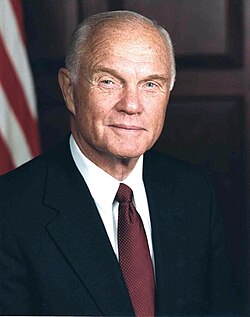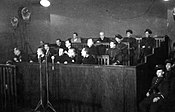Portal:History
The History Portal
History is the systematic study of the past, focusing primarily on the human past. As an academic discipline, it analyzes and interprets evidence to construct narratives about what happened and explain why it happened. Some theorists categorize history as a social science, while others see it as part of the humanities or consider it a hybrid discipline. Similar debates surround the purpose of history—for example, whether its main aim is theoretical, to uncover the truth, or practical, to learn lessons from the past. In a more general sense, the term history refers not to an academic field but to the past itself, times in the past, or to individual texts about the past.
Historical research relies on primary and secondary sources to reconstruct past events and validate interpretations. Source criticism is used to evaluate these sources, assessing their authenticity, content, and reliability. Historians integrate the perspectives of several individual sources to develop a coherent narrative. Different schools of thought, such as positivism, the Annales school, Marxism, and postmodernism, have distinct methodological approaches.
History is a broad discipline encompassing many branches. Some focus on specific time periods, such as ancient history, while others concentrate on particular geographic regions, such as the history of Africa. Thematic categorizations include political history, military history, social history, and economic history. Branches associated with specific research methods and sources include quantitative history, comparative history, and oral history.
History emerged as a field of inquiry in antiquity to replace myth-infused narratives, with influential early traditions originating in Greece, China, and later in the Islamic world. Historical writing evolved throughout the ages and became increasingly professional, particularly during the 19th century, when a rigorous methodology and various academic institutions were established. History is related to many fields, including historiography, philosophy, education, and politics. (Full article...)
Featured picture
Did you know (auto generated)

- ... that French historian Patrice Gueniffey called the 2023 film Napoleon a "very anti-French and very pro-British" rewrite of history?
- ... that Maggio di Accettura, a festival in Italy dedicated to the Christian martyr Saint Julian, might have pagan origins or be linked to Langobard history?
- ... that the Picts disappeared from the historical record after the devastation suffered following the Battle of Dollar?
- ... that fifteen future Pro Football Hall of Fame players have been drafted by the Detroit Lions?
- ... that the 2022 Boca Raton Bowl was the first bowl game loss in Liberty program history after three wins in their first three appearances?
- ... that the historic mansion Bulgur Palas in Istanbul hosted a birdhouse for hundreds of domestic canaries in one room during its ownership by the Ottoman Bank?

Calvin Coolidge (born John Calvin Coolidge Jr.; /ˈkuːlɪdʒ/ KOOL-ij; July 4, 1872 – January 5, 1933) was the 30th president of the United States, serving from 1923 to 1929. A Republican lawyer from Massachusetts, he previously served as the 29th vice president from 1921 to 1923 under President Warren G. Harding, and as the 48th governor of Massachusetts from 1919 to 1921. Coolidge gained a reputation as a small-government conservative with a taciturn personality and dry sense of humor that earned him the nickname "Silent Cal".
Coolidge began his career as a member of the Massachusetts State House. He rose up the ranks of Massachusetts politics and was elected governor in 1918. As governor, Coolidge ran on the record of fiscal conservatism, strong support for women's suffrage, and vague opposition to Prohibition. His prompt and effective response to the Boston police strike of 1919 thrust him into the national spotlight as a man of decisive action. The following year, the Republican Party nominated Coolidge as the running mate to Senator Warren G. Harding in the 1920 presidential election, which they won in a landslide. Coolidge served as vice president until Harding's death in 1923, after which he assumed the presidency. (Full article...)
On this day
April 5: Feast day of Saint Vincent Ferrer (Catholicism)
- 919 – The Fatimid Caliphate began a second unsuccessful invasion of Egypt, then under Abbasid rule.
- 1614 – Pocahontas (pictured), a Native American woman, married English colonist John Rolfe, leading to a period of peace between the Powhatan people and the inhabitants of Jamestown, Virginia.
- 1944 – Siegfried Lederer, a Czech Jew, escaped from Auschwitz with the aid of an SS officer who opposed the Holocaust.
- 1986 – The Libyan secret service bombed a discotheque in West Berlin, resulting in three deaths and 229 others injured.
- 2009 – The North Korean satellite Kwangmyŏngsŏng-2 was launched from the Tonghae Satellite Launching Ground and passed over Japan, sparking concerns it may have been a trial run of technology that could be used to launch intercontinental ballistic missiles.
- al-Nuwayri (b. 1279)
- Thure de Thulstrup (b. 1848)
- Marie-Rosalie Cadron-Jetté (d. 1864)
- Judith Resnik (b. 1949)
Selected quote
"Strike an enemy once and for all. Let him cease to exist as a tribe or he will live to fly in your throat again".
— Shaka, 19th century Zulu king
Related portals
More Did you know...
- ... that the anti-religious campaign culminating in the Stalinist show trial of the Kraków Curia (pictured) led to the imprisonment of 123 Polish Roman Catholic priests in just one year?
- ... that Confederate brigadier general Alfred E. Jackson was pardoned by President Andrew Johnson because of his kindness toward Johnson's family during the Civil War?
- ... that after HMS Porcupine was nearly split in two by a torpedo, the halves were nicknamed HMS Pork and HMS Pine?
- ... that the Experiment was a boat powered by horses running on a treadmill and propelled by a then-novel type of screw propeller?
- ... that one of the highest-ranking generals in China was injured in battle nine times?
- ... that in Mesopotamian mythology, the Apkallu were sent by the god Enki, from Dilmun to teach human beings various aspects of civilization?
- ... that Karl Marx's theory of historical trajectory attempted to prove the long-term unsustainability of capitalism?
- ... that in November 1921, the schooner Cymric collided with a tram in Dublin?
Topics
Categories

History • By period • By region • By topic • By ethnic group • Historiography • Archaeology • Books • Maps • Images • Magazines • Organizations • Fictional • Museums • Pseudohistory • Stubs • Timelines • Chronology • People • Wikipedia historians
WikiProjects
![]() WikiProject History •
Ancient Near East • Australian History • Classical Greece and Rome • Dacia • Former countries • History of Canada • Chinese history • European history • Heraldry and vexillology • Indian history • Jewish history • Medieval Scotland • Mesoamerica • Military history • Middle Ages • History of Science
WikiProject History •
Ancient Near East • Australian History • Classical Greece and Rome • Dacia • Former countries • History of Canada • Chinese history • European history • Heraldry and vexillology • Indian history • Jewish history • Medieval Scotland • Mesoamerica • Military history • Middle Ages • History of Science
WikiProject Time • Days of the Year • Years
WikiProject Biography • Composers • Political figures • Saints • United States Presidents
Things you can do
 |
Here are some tasks awaiting attention:
|
Associated Wikimedia
The following Wikimedia Foundation sister projects provide more on this subject:
-
Commons
Free media repository -
Wikibooks
Free textbooks and manuals -
Wikidata
Free knowledge base -
Wikinews
Free-content news -
Wikiquote
Collection of quotations -
Wikisource
Free-content library -
Wikiversity
Free learning tools -
Wiktionary
Dictionary and thesaurus
























![Image 9 Apollo 11 Photograph credit: Neil Armstrong Apollo 11 was the fifth crewed mission of NASA's Apollo program. After launching from the Kennedy Space Center in Florida on July 16, 1969, commander Neil Armstrong and Apollo Lunar Module pilot Buzz Aldrin landed Eagle in Mare Tranquillitatis on July 20, at 20:17:40 UTC, while command module pilot Michael Collins remained on Columbia in lunar orbit. Armstrong was the first to exit the spacecraft, stepping onto the surface 6 hours and 39 minutes later, on July 21, at 02:56:15 UTC; nineteen minutes later, Aldrin joined him on extravehicular activity, which lasted 2 hours, 31 minutes and 40 seconds. Armstrong and Aldrin lifted off from Tranquility Base after almost 22 hours on the lunar surface and rejoined Collins in the command module, before splashing down in the Pacific Ocean on July 24. The mission was planned to the minute, with the majority of the photographic tasks performed by Armstrong with a single Hasselblad camera. Most of the photographs taken on the Moon that include an astronaut are of Aldrin; there are only five images of Armstrong partly shown or reflected, as in this photograph, with Armstrong and the lunar module reflected in Aldrin's helmet visor. "As the sequence of lunar operations evolved," Aldrin explained, "Neil had the camera most of the time [...] It wasn't until we were back on Earth and in the Lunar Receiving Laboratory looking over the pictures that we realized there were few pictures of Neil." More featured pictures](http://upload.wikimedia.org/wikipedia/commons/thumb/9/98/Aldrin_Apollo_11_original.jpg/120px-Aldrin_Apollo_11_original.jpg)





























